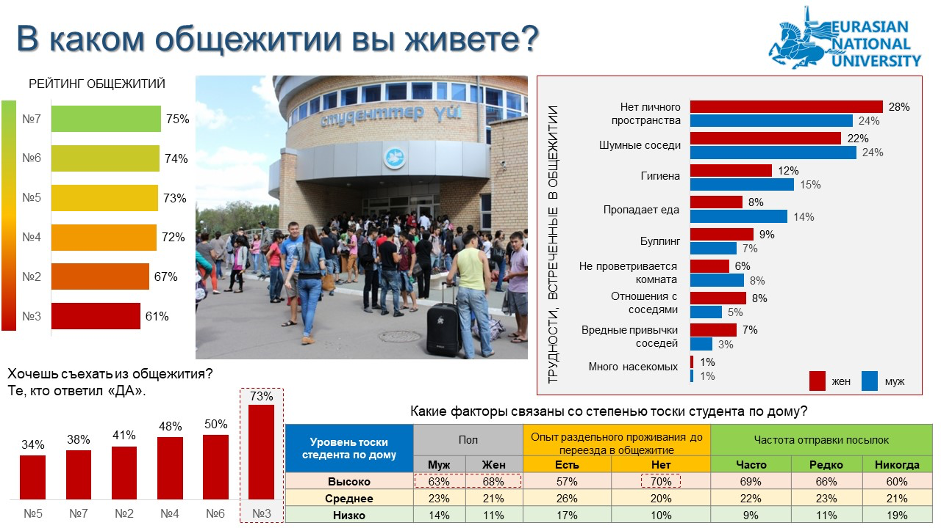Since there are many rumors in the walls of the ENU about the unsuitability of dormitories for living, sociologists of the 1st year decided to conduct a study in accordance with a representative selection from April 15 to 29 of this year. 54% of 1st year students live in six dormitories of the university, that is 2,359 students, of which 726 were selected for the survey.
Most of those living in the student houses have a family income of 250-500 thousand tenge and were brought up in large families. For 70% of them, the dormitory is the first experience of living apart from their loved ones.
74% of students decided that it is better to live in a dormitory, even if they have close relatives living in Astana. Although about 90% of students complain about the lack of personal space, noisy neighbors and unsanitary conditions, they try not to pay attention to these problems because of the low price and convenient location of the student house. In addition, it turned out that students choose a dormitory because of the rapid dissemination of information (exam questions and answers) among residents.
Analyzing the respondents' answers, the following conclusions were made:
In particular, the residents of the 3rd dormitory are not satisfied with the condition of furniture, toilet, shower, as well as the work and courtesy of the staff. For this reason, 73% of them intend to move. Although the residents of the dormitory № 7, which is considered as one of the new ones, complained a lot about the lack of a dining room and a shop, according to other criteria they gave high marks, and only 38% of them want to move out. The least willing to move out live in the dormitory №5. So are these indicators related to the general condition of the hostel?
The rating of urgent problems among residents differs significantly by gender groups. Almost 30% of the girls surveyed noted the problem of lack of personal space and noisy neighbors. Also, the problem of "bullying" among girls is more common than among boys. For this reason, it is difficult for them to establish good relations with their neighbors. Guys also face issues such as lack of personal space and noisy neighbors. But the most interesting thing is that among them the problem of stealing food often arises. A low rate of pest problems means that dormitory staff are closely monitoring sanitation.
It was revealed that a high level of homesickness in a student was associated with his gender, as well as with whether he lived separately before moving to a student house. Interestingly, students who receive parcels more often miss their loved ones more.
Rating criteria:
1. Conditions of the restroom, shower and furniture
2. Number of furniture and household appliances
3. Work and courtesy of service personnel
4. Location of the dormitory
5. Heating and comfort
6. Assessment of residents in general
7. Feeling of safety
8. Plenty of personal space
9. No pests
10. Room ventilation
Considering these criteria, dormitory №7 received the highest score. However, the following three dormitories are also not far behind: respectively - 74%, 73%, 72%. In fifth place is dormitory №2 with an indicator of 67%. Unfortunately, the last place was taken by student house №3. Based on the results, it was concluded that the desire of tenants to move out of the dormitory is actually not related to the conditions of it.
Interesting facts:
● 90% of the residents would be pleased with the opening of a coworking area and the installation of printers.
● Students would rather be able to do laundry for free than remove entry restrictions after 23:00.
● Instead of hiring cleaning companies, students are willing to continue cleaning themselves.
Summing up, we can say that there are still many problematic issues in the dormitories that need to be resolved, but in each new dormitory they are taken into account. In this regard, it was concluded that the old dormitories need to be repaired and the principles of organizing living in them need to be changed. More details will come after a more detailed study.
Authors 1st year students:
Aizhan Ussen
Togzhan Uatay
Amina Kazken
Agina Rizabek
Markhabat Toksan
Leaders:
Shyngys Torez
Bayan Smagambet


